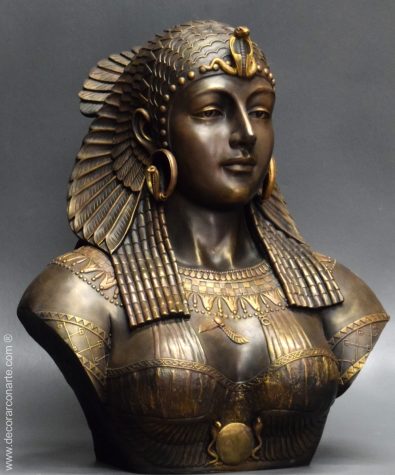OP/ED: Cleopatra – We Know Her Name, But Do We Know Her Race?
In the annals of history, her name has become synonymous with true and unrivaled power.
When one hears her name, a fierce sharp image materializes in their mind. A cunning and clever woman who was the human embodiment of manipulation and what it meant to lead a kingdom.
We all know her name, but do we know her ethnicity?
Cleopatra VII is perhaps the most famous woman in all of history. The lover of Julius Caesar and Mark Antony, and the last Pharaoh of the Ptolemaic Kingdom of Egypt. A woman like her needs no introduction.
I’d argue that there isn’t anyone on this planet who hasn’t spoken or even heard her name.
And perhaps that’s why no one seems to agree on what exactly the ancient Egyptian queen truly looked like.
“Cleopatra was Greek,” wrote Twitter user MT. Scott, “This isn’t some lost age queen, with only some dusty mummy and a few hieroglyphs to decode her story with. She is closer to the age of cell phones than the age of the pyramids. We know quite clearly her family history.”
The recent announcement that Netflix and actress/producer Jada Pinkett Smith will be teaming up on a project entitled Queen Cleopatra, a documentary/reenactment that chronicles the tale of the rise and fall of Egypt’s most beloved female pharaoh.
On the surface, nothing seems to be out of the ordinary. Before watching the trailer, I was genuinely confused about why Cleopatra was a trending topic. And then I stumbled onto the race controversy.
Dozens of Twitter users ranted about the fact that the actress portraying the legendary woman was African-American. And as someone well aware of the fact that many online always get enraged when the race of a character or historical figure is changed, I went to Netflix’s defense.
Who cares about the actress’s skin color? And who cares if Netflix wants to reimagine Cleopatra’s story for modern audiences?
The Impact’s own Diannah Plaisir wrote heavily on this subject matter.
I was instantly annoyed by these people crying online and complaining about the race of the lead actress. My thinking was and still is: if she is the right fit for the role it doesn’t matter what her skin color is.
Then I saw the trailer. And immediately realized the deeper reason for the discourse.
From Executive Producer @jadapsmith comes a new docuseries exploring the lives of iconic African queens.
QUEEN CLEOPATRA follows the story of Cleopatra, one of the world’s most famous and misunderstood woman.
QUEEN CLEOPATRA is available to stream May 10 only on Netflix pic.twitter.com/0oDUSi8Add
— Strong Black Lead (@strongblacklead) April 12, 2023
One of the lines that struck me the most was, “I remember my grandma telling me I don’t care what they tell you in school, Cleopatra was black.”
Here we tap into the real controversy. This historical documentary is heavily playing into the idea that Cleopatra was black.
After researching the riddle of her race, it turns out the topic has long been a polarizing and heated argument not only online but in academic circles.
Writer Duane Roller, who wrote for the Oxford University Press, summed it up best in her argument.
“It has been suggested – although generally not by credible scholarly sources – that Cleopatra was racially black African. To be blunt, there is no evidence for this, yet it is one of those issues that seems to take on a life of its own despite all indications to the contrary.”
Throughout the rest of her article, Roller chronicles the true racial ancestry of Cleopatra by analyzing the entire Ptolemaic line.
Ptolemy I, the founder of the dynasty, was a man of Macedonian Greek origin and war general to Alexander the Great. After Alexander’s death, Ptolemy took control of Egypt, and eventually, the title of a pharaoh was passed down to his descendants leading us to the last ruling pharaoh, Cleopatra.
Nothing seems out of the ordinary until we keep in mind the variable of incest.
The Ptolemaic dynasty is infamously inbred. Cousin married cousin and sibling married sibling to ensure power was kept in the family.
Meaning that by the time we get to Cleopatra, her genealogy was still for all intents and purposes, more Greek than anything else.
Cleopatra and her family lived in a privileged bubble. She was culturally Egyptian, spoke the language (and was the first in her dynasty to do so), and worshipped the many Egyptian gods. We must let go of the idea that the pharaoh fits perfectly into our modern-day perception of race.
Genetically, she was very far removed from Egyptian ancestry.
So why does this little history lesson matter?
When we in the modern world put our views of race and ethics into a historical figure that even wouldn’t understand the idea of black and white, we are forcing our modern ideas onto a very ancient culture.
Many historians have argued that it’s almost meaningless to question Cleopatra’s skin color because ancient Egyptians themselves didn’t see the concept of race the way we do since race is arguably a very modern concept.
Why would Netflix produce a documentary that’s only being promoted as a black empowerment story that tells the truth about Cleopatra?
Profit is the only reason.
Companies like Netflix seem to tend to latch onto progressive movements only when it benefits them.
They could not care less to empower actual black historical figures, they only care to commercialize the fact that many want to believe Cleopatra was a black pharaoh.
And arguably, documentaries like Queen Cleopatra set back the mission to fix actual whitewashed historical figures. It’s like taking one step forward and three steps back.
The reason this issue bothers me is that yes, the whitewashing of historical figures who changed the course of human history is an important and prevenient issue that we need to address and prevent.
 And yes, Cleopatra herself is a victim of whitewashing. Since she was portrayed by actresses like Elizabeth Taylor, who was predominantly English with German, Swiss, Irish, and Scottish roots.
And yes, Cleopatra herself is a victim of whitewashing. Since she was portrayed by actresses like Elizabeth Taylor, who was predominantly English with German, Swiss, Irish, and Scottish roots.
But the reaction to a white Cleopatra isn’t to make her black. It should be to ensure that she is portrayed with as much historical accuracy as possible.
But, when we focus on the idea of a black Cleopatra, we without knowing it ignores many black men and women of history throughout history whose races were purposefully either ignored or completely changed to fix the Eurocentric agenda that the only important people in history who were white.
At the end of the day, is regressive to only want to talk about Cleopatra’s skin color. The only way to discover the exact complexion of her skin is to travel back in time.
She was a queen who was worshiped like a goddess on Earth and who fought until the very end for Egyptian independence against the Romans.
When we look at history books, we shouldn’t want to remember her for her race. We should want to remember her for her charisma, intelligence, and leadership.

Maleek Munroe is a senior at Mercy College, majoring in communications. He graduated Nyack High School, where he found his love and passion for both...








